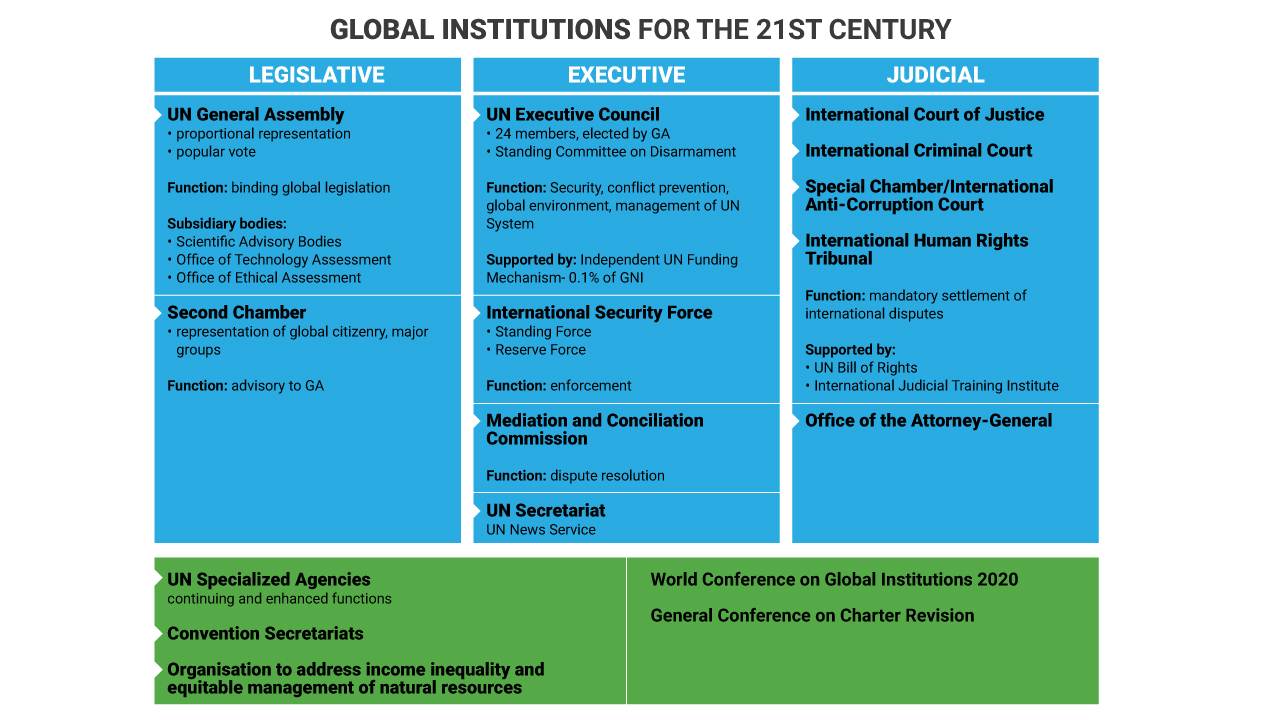
ESTOCOLMO — Los sistemas de gobernanza mundial deben evolucionar a medida que el mundo se vuelve más interconectado y que se hace sentir cada vez con más fuerza el imperativo de unir a la humanidad. Esta idea es el núcleo de una propuesta galardonada para remodelar la gobernanza mundial, presentada por tres bahá’ís que se están especializando en aspectos de la gobernanza en asuntos internacionales.
«Muchos de los problemas que enfrentamos son de alcance planetario. No pueden resolverse sin algún tipo de mecanismo más sólido de cooperación internacional», afirma Augusto López-Claros, economista internacional y coautor de la propuesta.
La ONU proporciona una base para la gobernanza mundial pero la propuesta aboga por un órgano de gobierno internacional más fuerte y describe un mecanismo con dos cuerpos legislativos: uno con representantes nacionales y el segundo con delegados que representen problemas mundiales específicos, como el medio ambiente, los derechos humanos y otros. También incluiría una rama ejecutiva reforzada con una fuerza de seguridad internacional, así como una judicatura internacional bien capacitada que tome regularmente decisiones vinculantes.

La propuesta fue una de los tres ganadores del Premio New Shape en mayo de la Fundación Global Challenges, una organización sin fines de lucro que tiene como objetivo estimular las discusiones sobre los sistemas para la gestión de los riesgos mundiales.
El Dr. López-Claros, ex Director del Grupo de Indicadores Globales del Banco Mundial y actualmente miembro de la Escuela diplomática de la Universidad de Georgetown, colaboró con Maja Groff, abogada internacional con sede en La Haya, Países Bajos, y Arthur Dahl, ex alto funcionario del Programa de las Naciones Unidas para el Medio Ambiente y actual presidente del Foro Internacional de Medio Ambiente, sobre la propuesta de reforma de la ONU y otras instituciones mundiales. Bajo el título «Gobernabilidad mundial y surgimiento de instituciones mundiales para el siglo XXI», la propuesta destaca la necesidad de un sistema de gobernanza mundial capaz de abordar con eficacia los principales desafíos contemporáneos que enfrenta la humanidad.
«Los principios y diversos aspectos de nuestra propuesta se basan en la sabiduría de múltiples generaciones y pensadores de diversos orígenes» afirma la Sra. Groff, que trabaja con la Conferencia de La Haya de Derecho Internacional Privado. «Esperamos comprometernos con las aspiraciones comunes de la humanidad».
El Dr. Dahl señaló que las últimas décadas han puesto de manifiesto las limitaciones del sistema de las Naciones Unidas para resolver problemas que traspasan las fronteras nacionales, un desafío que requiere un nuevo pensamiento sobre la ONU, su evolución ulterior y su mandato. «Una serie de crisis intrínsecamente mundiales no puede resolverse fuera del marco de la acción colectiva internacional que involucra cooperación supranacional y un replanteamiento fundamental del significado de interés nacional», describe el documento.
Para los tres autores, esto significa que es necesario basarse en las estructuras existentes en la ONU. «En conjunto, nuestras propuestas garantizarían que la ONU avance lo antes posible hacia un modelo de gobernanza coherente, análogo a lo que esperamos de los sistemas gubernamentales nacionales efectivos con capacidades de seguimiento permanente y respuesta rápida a los riesgos mundiales actuales y emergentes», explicó la Sra. Groff.